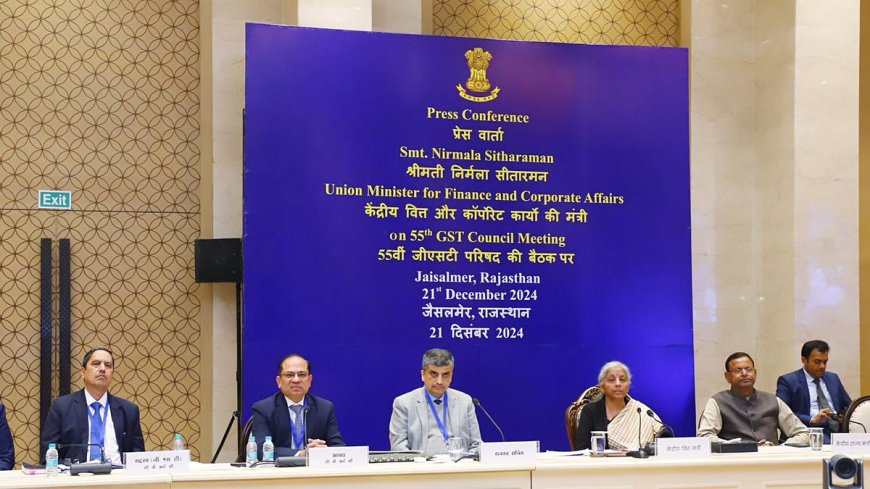Centre notifies rules for GST appellate tribunals; provides for mandatory e-filing, hybrid hearing

Centre notifies rules for GST appellate tribunals; provides for mandatory e-filing, hybrid hearing
Asarkari - Sarkari News, Jobs & Updates
By Priya Sharma
In a significant development aimed at streamlining the Goods and Services Tax (GST) dispute resolution mechanism, the Central government has officially notified the rules governing the functioning of GST Appellate Tribunals (GSTAT). These comprehensive rules, issued by the Ministry of Finance, lay down the framework for the establishment and operation of these crucial judicial bodies, incorporating modern technological advancements like mandatory electronic filing (e-filing) and provisions for hybrid hearings.
kam sabdo me kahein to, the Centre has finalized rules for GST Appellate Tribunals, introducing mandatory e-filing and hybrid hearing options to streamline the GST appeal process and reduce the burden on higher courts.
Key Highlights of the Notified GSTAT Rules
The notification marks a crucial step forward since the amendments made to the Central Goods and Services Tax (CGST) Act, 2017, through the Finance Act, 2023, which paved the way for the creation of GSTAT. The newly notified rules detail the procedural aspects, administrative functioning, and technological integration within the tribunals.
One of the most notable features is the mandatory requirement for e-filing of all appeals, applications, and documents. This move towards digitalization is expected to significantly enhance efficiency, reduce paperwork, ensure transparency, and provide ease of access for taxpayers and legal representatives across the country. Filing appeals electronically will eliminate geographical barriers and streamline the submission process, making it faster and more convenient.
Furthermore, the rules explicitly provide for hybrid hearing options. This means that hearings before the GSTAT benches can be conducted either physically, virtually, or in a combination of both modes. This flexibility is a welcome measure, particularly in the post-pandemic era, allowing parties involved to participate remotely if necessary, saving time and travel costs. It ensures that justice delivery remains accessible and adaptable to varying circumstances.
The structure of the GSTAT, as outlined previously and reinforced by these rules, includes a Principal Bench located in New Delhi and multiple State Benches across various states and union territories. This decentralized structure aims to bring the appellate mechanism closer to the taxpayers, facilitating easier access to justice.
Impact on GST Dispute Resolution Landscape
The establishment and operationalization of GSTAT based on these rules are eagerly awaited by businesses and tax professionals. Currently, taxpayers aggrieved by orders from the first appellate authority often have to approach High Courts, leading to a significant backlog and prolonged litigation cycles. The GSTAT will serve as a dedicated second appellate forum specifically for GST matters, thereby reducing the burden on High Courts and ensuring quicker resolution of disputes.
Experts believe that a specialized tribunal like GSTAT, equipped with members having judicial and technical expertise in taxation, will lead to more informed and consistent decisions on complex GST issues. The emphasis on technology through mandatory e-filing and hybrid hearings demonstrates a forward-looking approach, aligning the GST dispute resolution process with global best practices.
This streamlined process is expected to improve the overall ease of doing business in India. Clearer and faster dispute resolution mechanisms contribute significantly to a stable tax environment, boosting taxpayer confidence. For more updates on government regulations and job notifications, visit https://asarkari.com.
What This Means for Taxpayers and Businesses
For taxpayers, the notification of these rules signifies that the much-anticipated GSTAT is closer to becoming a reality. The mandatory e-filing system, while requiring initial adaptation, promises long-term benefits in terms of convenience and efficiency. The hybrid hearing option offers unprecedented flexibility, allowing businesses, especially small and medium enterprises (SMEs), to participate in proceedings without incurring substantial travel expenses.
The focus now shifts to the actual establishment of the Principal and State benches and the appointment of members. While the rules are in place, the effective functioning of the tribunals depends on timely infrastructure setup and staffing. The government is expected to expedite these processes to make the GSTAT operational soon.
In conclusion, the notification of the GSTAT rules, incorporating mandatory e-filing and hybrid hearing provisions, is a landmark step in strengthening India's GST framework. It promises a more efficient, accessible, and technology-driven dispute resolution system, which will benefit taxpayers and contribute positively to the country's economic landscape by reducing litigation timelines and promoting tax certainty.
Team Asarkari
Keywords
GSTAT rules notified, GST Appellate Tribunal, mandatory e-filing GST, hybrid hearing GST appeal, Centre notifies GSTAT rules, GST dispute resolution, CGST Act amendment, GST appeal process India, Ministry of Finance GST notification, GSTAT Principal Bench, GSTAT State Benches, taxpayer appeal GST, ease of doing business IndiaWhat's Your Reaction?
 Like
0
Like
0
 Dislike
0
Dislike
0
 Love
0
Love
0
 Funny
0
Funny
0
 Angry
0
Angry
0
 Sad
0
Sad
0
 Wow
0
Wow
0










































